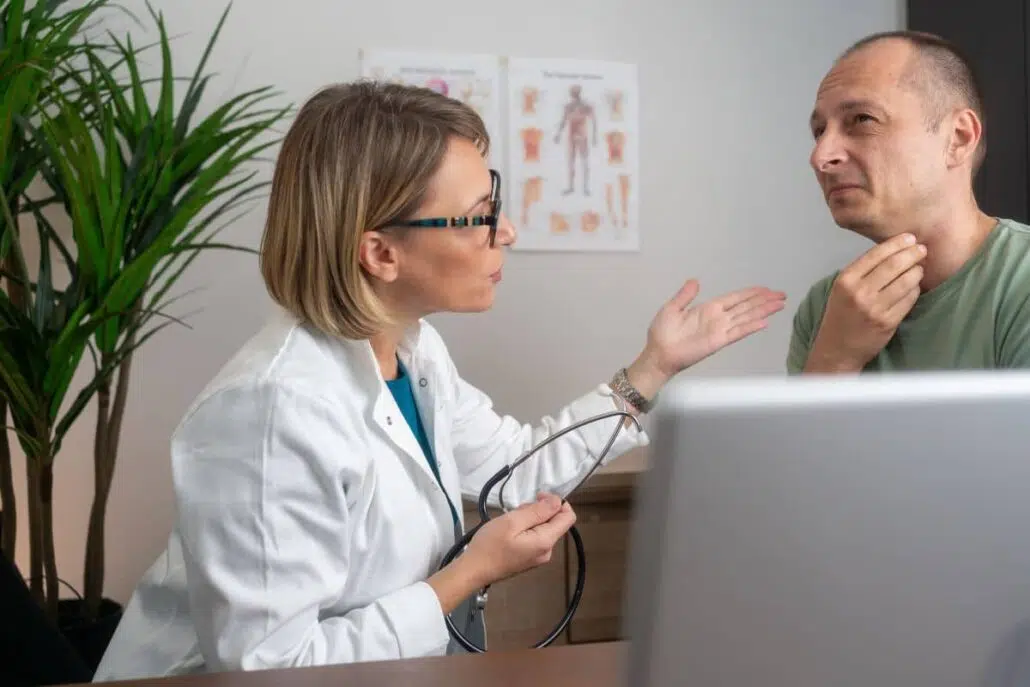Choral singing is one of the most popular performing arts activities in the United States, with more than 54 million adults and children participating in some form of choir singing each year. In communities like Lawrenceville, NJ, local choirs—from adult ensembles at the Presbyterian Church of Lawrenceville and the Church of Saint Ann to student groups at Westminster Choir College and Notre Dame High School—offer powerful opportunities for connection, creativity, and expression through music.
But for many choir members, especially those who sing regularly or at a high level, voice issues can become a challenge. From vocal fatigue to hoarseness, seemingly minor throat discomfort can evolve into more serious voice problems if not addressed early. Whether you’re part of a church choir, school chorus, or professional vocal ensemble, understanding how to care for your voice is essential for long-term vocal health.

At Becker ENT & Allergy in Lawrenceville, our team of ENT and voice care specialists support singers of all backgrounds—helping protect, restore, and strengthen the professional voice. If you’re in a choir and noticing vocal strain, hoarseness, or breathing issues, it may be time to explore voice therapy or schedule a medical voice evaluation.
Common Voice Problems Faced by Choir Singers
Singing in a group may seem like a low-risk activity, but choral singing can pose unique challenges to the vocal cords and throat. Some of the most common issues include:
Vocal Fatigue and Strain
Extended rehearsals, especially if the singing lies beyond a vocalist’s comfort range, can lead to vocal fatigue. If you’re singing regularly without enough rest, your vocal folds may become inflamed, making it harder to produce clear, resonant sound.
Tessitura Mismatch
Sometimes choir members are assigned parts that don’t suit their natural vocal range. Singing too high or too low consistently can cause strain or lead to hoarseness and other voice problems over time.
Blending and Tuning Pressure
In group settings, there’s often pressure to match pitch, volume, and tone with others, which can result in pushing the voice beyond its limits. This is especially true in choirs where vibrato is discouraged or where precise tuning is emphasized.
Poor Technique and Lack of Warm-Up
Failing to warm up properly or using improper breathing techniques can lead to vocal strain. Many choir singers don’t receive formal training and may unknowingly adopt habits that cause damage over time.
Environmental Factors
Dry air, dust, and allergens can irritate the throat and vocal cords. In some rehearsal spaces, ventilation may be poor, which can dry and irritate the throat and increase the risk of voice problems.
Performance Anxiety
Nervousness before singing can lead to muscle tension in the neck, shoulders, and throat, affecting vocal performance. This tension may interfere with airflow and resonance.
Age-Related Changes
As we age, the vocal cords may lose flexibility and strength. Older choir members may notice reduced vocal range or increased vocal fatigue, especially without proper voice care.
Why Vocal Cord and Throat Health Matters for Singers
Singing is not just a hobby, it’s a physical activity that relies on delicate muscles and tissues in the throat. The vocal cords (or vocal folds) must vibrate rapidly and precisely to produce sound. Over time, misuse or overuse of the voice can lead to nodules, polyps, or chronic hoarseness.

For professional voice users, such as choir directors, music teachers, or members of elite choral groups like those at Westminster Choir College, maintaining a healthy voice is part of maintaining your identity. That’s why voice therapy, regular voice evaluations, and ENT and voice care are critical for preventing long-term damage.
Even those who sing occasionally may be at risk. If you’re frequently clearing your throat, losing vocal power, or struggling to reach notes that used to be easy, these could be signs of underlying voice disorders. Early treatment is key.
Vocal Hygiene Tips for Singers
Vocal hygiene refers to daily habits and practices that support vocal health. Whether you’re new to choir or have been singing for decades, the following tips can help prevent injury and support vocal longevity:
- Hydrate consistently. Drink plenty of water throughout the day to keep the vocal cords lubricated.
- Warm up before rehearsals. Gentle humming, lip trills, and light scales can prepare the voice for more demanding singing.
- Avoid overuse. Take vocal naps during the day (i.e. short periods of intentional silence). Avoid yelling or speaking loudly, especially after long rehearsals.
- Treat allergies and reflux. Conditions like post-nasal drip or acid reflux can irritate the throat. ENT care can help identify and treat these issues if they exist for you.
- Avoid throat clearing. This habit can damage the vocal cords over time when done excessively. Try swallowing or sipping water instead.
- Limit caffeine and alcohol. These can dehydrate the body and affect the throat.
- Maintain good posture. Neck and spine alignment can impact vocal projection and airflow.
- Rest your voice after illness. Singing while recovering from a cold or flu can increase the risk of vocal damage.

If your voice still feels tired or hoarse despite taking precautions, consider scheduling a voice evaluation with an ENT specialist.
Voice problems don’t go away on their own.
They can get worse over time! Visit us in our Lawrenceville office for lasting vocal health.
When to Book an ENT Appointment for Voice Problems
Many singers delay seeking medical advice because they assume vocal fatigue or hoarseness is just part of the job. But recurring issues should not be ignored. It’s time to see an ENT specialist if you experience:
- Hoarseness lasting more than two weeks
- Loss of vocal range
- Frequent voice breaks or changes
- Pain or tightness when singing
- Frequent throat clearing or dry throat
- Breathing difficulty during performances
- Swelling in the neck
- Signs of underlying ENT issues like frequent nosebleeds, sinus infections, or enlarged tonsils and adenoids
At Becker ENT & Allergy, our team uses advanced tools like videostroboscopy to examine the vocal cords and throat in detail. This allows us to identify issues early and create a custom treatment plan.
Voice Therapy and ENT Treatments for Vocal Cord Disorders
Voice therapy is often the first step for singers with vocal problems. At Becker ENT & Allergy, our voice therapy programs are designed to help professional voice users heal injuries, reduce strain, and restore vocal strength.

Depending on the diagnosis, treatment options may include:
- Voice rest or vocal naps to allow healing
- Speech-language therapy with a voice therapist
- Medical treatment for underlying conditions like reflux, allergies, or infections
- Microsurgery for lesions if needed
Our team works closely with each patient with teamwork between ENTs and speech therapists to achieve the best results.
Expert Care for the Professional Voice in Lawrenceville, NJ
Becker ENT & Allergy offers one of the most comprehensive ENT and voice care programs in Lawrence Township. Our multidisciplinary team includes board-certified ENT specialists, voice therapists, and audiologists who collaborate to treat the full range of voice disorders and ENT concerns.
Our Lawrenceville office is easily accessible for choir singers throughout Mercer County and beyond. We take the time to understand each patient’s vocal demands—whether you’re a soloist at Westminster Choir College, a member of a church choir, or a passionate community singer.
Book an ENT Appointment for Voice Therapy in Lawrenceville
If you sing in a choir and have been struggling with vocal fatigue, hoarseness, or other symptoms, don’t wait for it to get worse. Early intervention can protect your voice and help you continue singing for years to come.
Contact Becker ENT & Allergy in Lawrenceville to schedule a comprehensive voice evaluation. Our ENT and voice care team will listen to your concerns, perform a thorough exam, and recommend the right treatment plan for your needs.
Your voice is one of your most valuable tools—take care of it with the help of trusted professionals.

